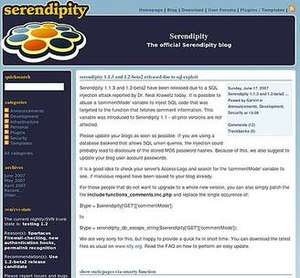Serendipity (software)
Serendipity is a blog and web-based content management system written in PHP and available under a BSD license. It supports PostgreSQL, MySQL, SQLite database backends, the Smarty template engine, and a plugin architecture for user contributed modifications. [2]
 Serendipity's official blog | |
| Developer(s) | Serendipity Developer Team |
|---|---|
| Stable release | |
| Repository | |
| Written in | PHP |
| Operating system | Unix-like, Windows |
| Platform | Cross-platform |
| Type | content management system |
| License | BSD license |
| Website | www |
Serendipity is available through a number of "one-click install" services such as Installatron.[3]
Features
Serendipity's plugin architecture allows users to easily modify both the appearance of the blog and its features.
Serendipity's SPARTACUS plugin automatically checks the central repository for plugins/templates upgrades and new functionality whenever a user checks the list. Users can install more than 120 plugins, instantly enhancing their blogs' functionality. [4]
- WYSIWYG and HTML editing
- Built-in, powerful media database, can add media from URL or local file
- Multiple authors, configurable permission/usergroup system
- Threaded comments, nested categories, post to multiple categories
- Multiple languages (internationalization)
- Online plugin and template repository for easy plug-and-play installation
- Easy drag-and-drop sidebar plugins organization
- Category-based sub-blogs
- Static Pages
- Podcasting
- RSS planet/aggregator
- Robust spam blocking
- Tag support
- One-click upgrading from any version
- Can be embedded into your existing web pages
- Standards-compliant templating through Smarty
- Remote blogging via XML-RPC
- BSD-style licensing
- Multiple Database support (SQLite, PostgreSQL, MySQL, MySQLi)
- Shared installations can power multiple blogs from just one codebase
- Native import from earlier blog applications (WordPress, Textpattern, Moveable Type, bblog, etc.)[5]
- Search engine-friendly permalink structure
- TrackBack and Pingback
- default template for frontend and backend have responsive web design
History
The Serendipity project was started by Jannis Hermanns in the winter of 2002, then still called jBlog. Due to a naming conflict with an existing blog publishing system, Sterling Hughes suggested the name serendipity. This suggestion is based on an Essay by Sam Ruby. The short form s9y stems from abbreviations such as i18n for internationalization where the number represents the amount of omitted letters. Today the project is maintained by Garvin Hicking.
Book
 | |
| Author | Garvin Hicking |
|---|---|
| Original title | Serendipity Individuelle Weblogs für Einsteiger und Profis |
| Language | German |
| Subject | Serendipity Weblog Software |
| Genre | Weblog Software |
| Publisher | OpenSourcePress |
Publication date | 2008 |
| ISBN | 978-3-937514-54-3 |
The first book about Serendipity was published in German by OpenSourcePress: Serendipity - Individuelle Weblogs für Einsteiger und Profis. [6] The publisher donated the book's copyright to the Serendipity project, who has released it under a CC-BY-NC-SA license and made a GitHub repository available online.[7]
See also
- Serendipity Official Website
- The Serendipity Handbook
- Serendipity PHP Weblog System at SourceForge
- Comparison of content management systems
References
- "Serendipity releases". github.com. Retrieved 2020-04-25.
- "Serendipity - PHP Script". Gscripts.net. 2 August 2006. Retrieved 19 September 2012.
- http://www.installatron.com/serendipity
- "Serendipity - Features". s9y.org. Retrieved 19 September 2012.
- "New kid on the blog: A look at Serendipity 1.0". Archived from the original on 2012-03-07.
- "https://www.amazon.de/Serendipity-Individuelle-Weblogs-Einsteiger-Profis/dp/3937514546". Open Source Press. Retrieved 19 September 2012. External link in
|title=(help) - "Das Serendipity Handbuch / The Serendipity Manual".